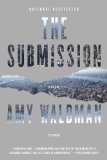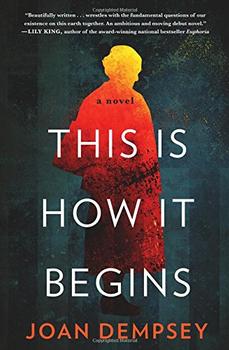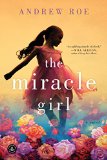Summary | Excerpt | Reading Guide | Reviews | Beyond the book | Read-Alikes | Genres & Themes | Author Bio

A Novel
by Amy WaldmanFirst time novelist, Amy Waldman, has created a gut-punch of a novel in The Submission, a tale that wonders: What would happen if the architectural design competition for the World Trade Center 9/11 Memorial was won by an American-Muslim?
The story opens two years after the attacks, with a jury deliberating over the two finalists in the Memorial Design competition - The Void and The Garden. The jury, after very tense and prolonged deliberations, finally selects its winner: The Garden. It is at this point the identity of the designer is revealed, an architect named Mohammad (Mo) Khan.
Chaos, of course, ensues as Khan's identity as an American-Muslim, is leaked to the media and citizens. Special interest groups and pundits argue for and against the fitness of both the individual and his design. Claire Burwell, whose husband died on September 11th, is a member of the jury as a representative of the families who lost loved ones in the attacks. Throughout the blind competition (the identities of those who submitted designs were kept secret), Claire was the most vocal champion for The Garden, feeling the concept offered the strongest opportunity for healing and reflection while honoring those who died. She is then thrust into an awkward and precarious position of balancing her belief in the winning design with the emotional and confrontational outbursts from the families she was supposed to be representing.
Waldman has created something I really love when reading fiction - unreliable narrators. Several main characters - Claire Burwell, Mo Khan, and Sean Gallagher - dig their heels in, waver, reevaluate themselves and others, and cause rippling consequences. Claire has long anchored her identity in liberal social thinking but has never really had to examine her convictions. Mo is arrogant and unknowable in his aloofness. He refuses, on the basis of being a free American citizen, to answer questions about his intentions with his design. This avoidance, on principle, leaves many confused and paranoid.
Sean lost his firefighter brother, Patrick, in the attacks and also lost himself. He felt he was never good enough growing up and had never really known his place in the world - until he began speaking out about his brother's death. But is that enough to give his own life meaning? All of these characters are tested and pushed to reassess their ways of thinking. Trying to make a difference in the world - which all three are striving to do - is not something that can be undertaken without fully knowing one's self.
At its heart, The Submission is a tale of caution; if you think you know yourself, please, think again. Readers are taken through a trifecta of large issues: grief, ambition, and prejudice. And early in the novel, a particular quote slapped me in the face: "You couldn't call yourself an American if you hadn't, in solidarity, watched your fellow Americans being pulverized, yet what kind of America did watching create?" It is an inescapable question. The media allowed for interminable full access, nonstop watching and reading at our disposal. Talking heads from television infiltrated our own minds. Special interest groups tore at our heartstrings. Pundits swayed our thinking this way and that. Throughout, there was never any disagreement that 9/11 was a domestic tragedy of global significance. A national embrace brought families who lost loved ones to our collective chest in an effort to support them and keep them safe. And yet. And yet there were so many competing interests fighting and often losing sight of the reason for the heightened passions and positions - the people who lost their lives.
The very title of this novel says a lot. Each character we meet is asked to submit - whether to alter a long-held belief, upend their moral center, or open a door to a stranger. The Submission also represents the architectural design Mohammad submits in hopes of creating an important work. Within a religious context, the word "muslim" means "one who voluntarily submits or surrenders to God's will." Around one simple word, so much turns. And as with Waldman's novel, a world evolves around one simple concept.
The author, a former journalist for The New York Times, and their South Asia Bureau co-chief for over three years, was in Manhattan on the the day of the attacks in 2001, and she spent the following six weeks reporting on the aftermath. Several years ago - while talking with a friend about the controversy Maya Lin endured when, in 1981, her Vietnam Veteran's Memorial design was selected through open competition - Waldman supposed that a Muslim-American planning the WTC Memorial would be a modern equivalent situation. And so, The Submission was born, as was her career as a novelist.
She has stated that in writing a story about 9/11, she "was just interested in looking at the variety of experiences and the grief. To tell the story from multiple perspectives." Waldman succeeds in achieving this goal beautifully with her debut novel; through her gifted prose and fully realized characters, she has created a very powerful reading experience.
![]() This review was originally published in The BookBrowse Review in October 2011, and has been updated for the
April 2012 edition.
Click here to go to this issue.
This review was originally published in The BookBrowse Review in October 2011, and has been updated for the
April 2012 edition.
Click here to go to this issue.

If you liked The Submission, try these:

by Joan Dempsey
Published 2017
Compulsively readable, This Is How It Begins is a timely novel about free speech, the importance of empathy, and the bitter consequences of long-buried secrets.

by Andrew Roe
Published 2016
A multi-faceted, multi-voiced debut novel that is a personal and heartfelt-chronicling of a family in flux, trying to find their individual and collective way-and also tells a larger, cultural story.
Your guide toexceptional books
BookBrowse seeks out and recommends the best in contemporary fiction and nonfiction—books that not only engage and entertain but also deepen our understanding of ourselves and the world around us.